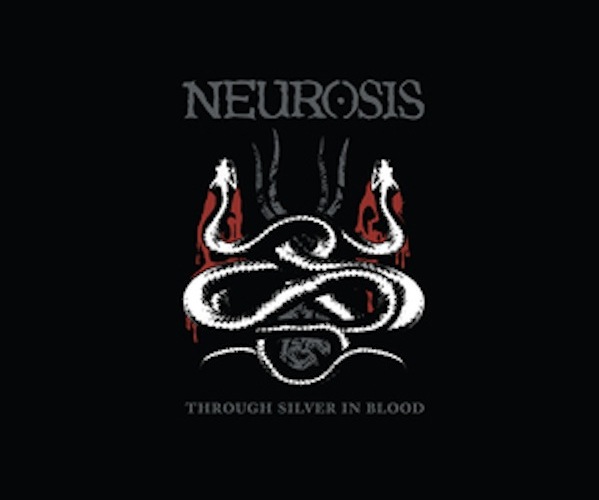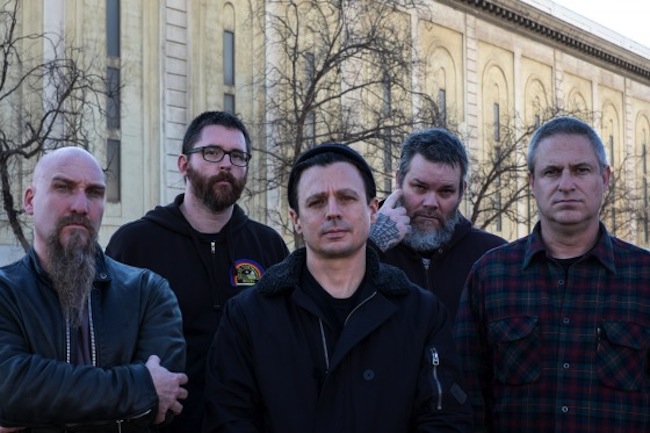Concert Review: Oakland’s Neurosis — Utterly Heavy Post-Metal
Neurosis is among the pioneers of the so-called post-metal sound, which knots the heavy and the heady into myriad patterns.

By Scott McLennan
The veteran band Neurosis does not come around very often, but when it does, it will lead the willing on a wild journey, as was the case during a sprawling show last Saturday at The Paradise in Boston.
Neurosis is among the pioneers of the so-called post-metal sound, which knots the heavy and the heady into myriad patterns.
Saturday’s opening acts, for instance, offered a good sampling of post-metal diversity. The Body served up a loud, two-man sonic assault that was more sculpted noise sprung from guitar and drums than outright music. Brothers of the Sonic Cloth, the latest outfit headed by guitarist Tad Doyle, laid out long, slow-burning jams. Sumac, whose drummer Nick Yacyshyn was the most dazzling musician on stage that night, maneuvered through frantic trio interplay that, like The Body in reverse, pulled crazed sounding noise into focused, razor-like passages that highlighted Aaron Turner’s guitar work.
Each of those openers nimbly showed how the brute force of metal could be pushed into different, provocative settings.
Neurosis then came on and promptly erased all of the previous boundaries: sludge, turbulence, precision, noise, they all flowed together — plus a bit of alluring beauty absent from the other bands’ sets — for a masterful performance.
On this rare extended trip from its home base in Oakland, Neurosis kept things simple, performing on a low-lit stage and letting the energy released by the set’s nine songs drive the narrative flow over 95 minutes. A quiet, methodical opening to the show’s first tune, “A Sun that Never Sets” anticipated the frantic, drum-fueled meltdown in the closing moments of the concert’s finale, “Through Silver in Blood.”

Neurosis — the band delivers music in big, crashing waves.
In between those points, the music arrived in big, crashing waves. As the band comes up on its 30th anniversary, the members of Neurosis make sure use of an easy chemistry among themselves. Guitarists Steve Von Till and Scott Kelly and bassist Dave Edwardson, for instance, passed around vocal parts in a manner that brought contour and texture to songs as well as reinforced the notion that everyone was responsible for carrying the weight of these sonic monoliths. Likewise, keyboard player and electronics maven Noah Landis layered in both subtle effects and aggressive counterpoints; his work swung the tone from industrial to psychedelic, at times within a single song, such as the epic “Distill (Watching the Swarm).”
Because there’s no questioning the band’s utter heaviness, Neurosis no one will dare accuse it of having commercial aspirations with the set’s occasional detour into melancholic or more fragile passages, like those that pop up in “The Tide” or buttress the lurching movements of “My Heart for Deliverance.”
Neurosis is as good as it gets when it comes to shifting the psychological landscape during a performance, using music to compel a listener into questioning what exactly is being experienced: is a world collapsing in on itself? Or is something blossoming amid the ruins?
Scott McLennan covered music for the Worcester Telegram & Gazette from 1993 to 2008. He then contributed music reviews and features to The Boston Globe, The Providence Journal, The Portland Press Herald and WGBH, as well as to the Arts Fuse. He also operated the NE Metal blog to provide in-depth coverage of the region’s heavy metal scene.
Tagged: Neurosis, Oakland, Paradise Rock Club Boston, post-metal sound
